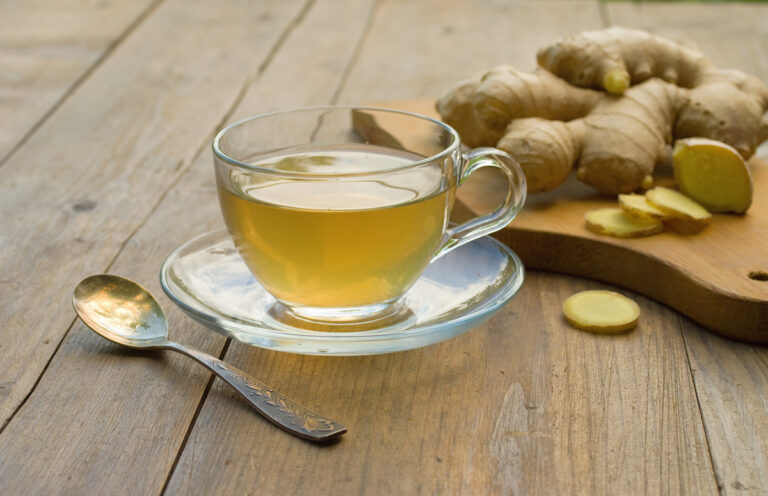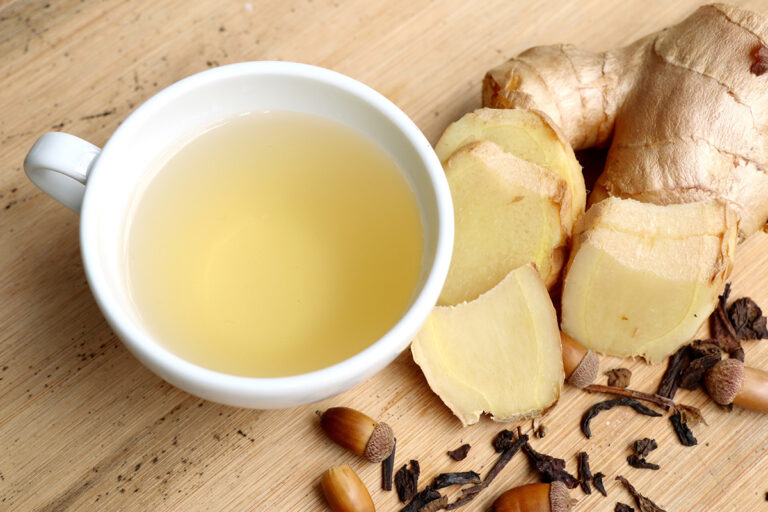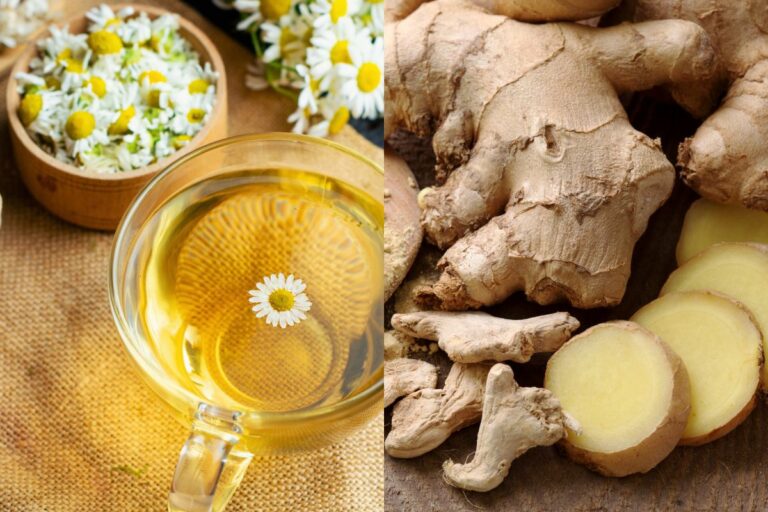Ginger Tea 101: Benefits, Side Effects, and How to Make It
Ginger tea is a simple blend of boiling water and ginger root. Its roots trace back to Traditional Chinese Medicine, where it’s been used for centuries due to its potential health benefits, including soothing nausea and reducing inflammation.

What Is Ginger Tea?
Ginger tea is a spicy, invigorating beverage made from the roots of the ginger plant, scientifically known as Zingiber officinale. It has a long history of use in various forms of traditional and alternative medicine. It can be consumed hot or cold, with added sweeteners or even infused with other health-boosting herbs and spices like lemon, honey, or turmeric.
Potential Health Benefits of Ginger Tea
Ginger tea has many health benefits, from aiding digestion to managing weight.
Aids in Digestion
Ginger tea is often recommended for its digestive benefits. The compounds in ginger can stimulate saliva, bile, and gastric enzymes to aid in digestion, thus helping in the assimilation of nutrients and the breakdown of food particles.
Anti-Inflammatory Properties
Ginger contains active compounds like gingerols and shogaols, which exhibit anti-inflammatory and antioxidant properties. Regular consumption of ginger tea may assist in reducing inflammation and protecting the body cells against harmful free radicals.
May Help with Weight Loss
Some research suggests that ginger can play a role in weight management. It is believed to enhance thermogenesis, increase satiety, and stimulate certain metabolic activities, potentially assisting in weight loss efforts.
Relieves Nausea and Vomiting
Traditionally, ginger tea has been used as a remedy for motion sickness, pregnancy-induced nausea, and chemotherapy-induced nausea. It’s believed that ginger’s compounds work by blocking the body’s reflex to vomit.
Ginger Tea Side Effects
While generally safe, ginger tea may cause certain side effects.
Can Cause Heartburn
While ginger is generally safe for most people, overconsumption may lead to heartburn or stomach upset due to its spiciness.
May Interfere with Blood-Thinning Medications
Ginger’s potential to inhibit platelet aggregation may interfere with blood-thinning medications. If you’re on such medications, consult with your healthcare provider before consuming ginger tea regularly.
Possible Allergic Reactions
Some individuals might experience allergies to ginger, resulting in symptoms like skin rash, eye irritation, or gastrointestinal discomfort. If you notice any adverse reactions after drinking ginger tea, it’s advisable to discontinue its use and consult a medical professional.
Does Ginger Tea Have Caffeine?
Ginger tea does not naturally contain caffeine. However, if it’s blended with other teas that do contain caffeine, such as black or green tea, then the final product will have caffeine. Always read the product label if you are sensitive to caffeine.
Best Ginger Teas to Try
There are many different ginger teas on the market, from pure ginger tea to blends like turmeric ginger tea and lemon ginger tea. To make your selection easier, we have bought, tasted, and identified the best ginger teas for you to try.
How to Make Ginger Tea
Making ginger tea at home is quite straightforward. Follow these simple steps:
- Wash a piece of fresh ginger root and peel it.
- Slice the peeled ginger into thin pieces.
- Add the ginger slices to a pot of water.
- Boil the water on medium heat for 10-15 minutes.
- Strain the tea into a cup.
- Add honey, lemon juice, or other flavors as desired.
Remember, if you’re using a pre-packaged product, always follow the manufacturer’s instructions on the packaging.
Final Thoughts
Ginger tea is a powerhouse of potential health benefits, from aiding digestion to relieving nausea. However, it’s important to remember that individual experiences may vary, and it’s always best to consult with a healthcare provider before making any significant changes to your diet.
FAQ
What Does Ginger Tea Taste Like?
Ginger tea has a unique flavor profile – it’s spicy, slightly sweet, and has a warming effect. Its distinctive, robust flavor can be moderated with the addition of honey or lemon, depending on your taste preference.
When Is the Best Time to Drink Ginger Tea?
There’s no universally ideal time to drink ginger tea, as it largely depends on your personal health goals. If you’re using it to aid digestion, it may be beneficial to consume after meals. For weight management, some prefer to drink it in the morning. However, due to its potential to interfere with sleep due to its stimulating properties, it’s generally recommended not to drink it too close to bedtime.
How Long Does Ginger Tea Last in the Fridge?
Brewed ginger tea can be stored in the refrigerator for up to a week. Be sure to store it in a clean, covered container to preserve its flavor and prevent it from absorbing other odors in the fridge.
Does Ginger Tea Stain Teeth?
Ginger tea is not known to stain teeth, unlike certain other teas and beverages like black tea or coffee. However, it’s always a good idea to maintain regular oral hygiene practices, including brushing and flossing, regardless of your choice of beverage.
Is Ginger Tea Good for Singers?
Yes, ginger tea can be beneficial for singers as it aids in soothing the throat, reducing inflammation, and clearing the vocal cords.
Is Ginger Tea Good for Muscle Pain?
Yes, ginger tea can potentially be beneficial for muscle pain. Ginger contains compounds known as gingerols and shogaols, which have anti-inflammatory and analgesic (pain-relieving) properties similar to non-steroidal anti-inflammatory drugs. They can help reduce inflammation and pain, potentially providing relief for muscle discomfort.
Is Ginger Tea Good for a Cold?
Yes, ginger tea can be beneficial for a cold. Ginger has anti-inflammatory properties and can help soothe a sore throat and reduce congestion. It’s also known for its potential immune-boosting properties.
Is Ginger Tea Good for Mucus?
Ginger tea can indeed be helpful for mucus. Ginger has anti-inflammatory properties that can help reduce inflammation of the mucous membranes, potentially lessening mucus production. It can also soothe a sore throat and provide relief from congestion.
Is Ginger Tea Good for Sciatica Pain?
Ginger tea could be helpful for sciatica pain, as ginger is known for its anti-inflammatory properties, which might alleviate inflammation around the sciatic nerve. However, it should not replace a comprehensive treatment plan from a healthcare professional.
Is Ginger Tea Good for Sinus Congestion?
Yes, ginger tea can be beneficial for sinus congestion. Ginger is known for its anti-inflammatory properties and can help to soothe inflamed nasal tissues, potentially providing relief from congestion.
Is Ginger Tea Good for Nerve Pain?
Ginger has powerful anti-inflammatory and antioxidant properties, which may help in reducing inflammation and pain, including nerve pain. Nonetheless, individual responses can vary, and more research is needed in this area. It’s recommended to consult with a healthcare provider for managing nerve pain.
Is Ginger Tea Good for Constipation?
Ginger tea is often recommended for digestive issues and can potentially help with constipation. Ginger is known to aid digestion by speeding up the movement of food from the stomach to the small intestine. It also has anti-inflammatory properties that can help soothe an upset stomach. While it may not directly stimulate a bowel movement, it can help reduce bloating and other digestive discomforts often associated with constipation.
Is Ginger Tea Good for Period Cramps?
Yes, ginger tea is commonly used for its potential pain-relieving properties, which can be beneficial for period cramps. Some studies suggest it might be as effective as some non-steroidal anti-inflammatory drugs for relieving menstrual pain.
Is Ginger Tea Good for Headaches?
Ginger tea can be helpful for headaches due to its anti-inflammatory properties, which can reduce inflammation and pain. Some studies suggest it may be as effective as some over-the-counter headache medications.



